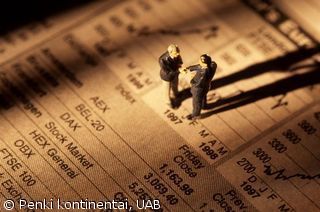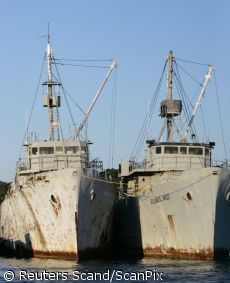It is the only source that can provide a chance for economic breakthrough
Published:
21 March 2005 y., Monday
Money from Russia’s Stabilisation Fund is expected to be invested abroad in dollar-nominated securities, with minimum investment risks and minimum profitability at 2-4%. These funds have until now been kept in Central Bank accounts. This means that a great deal of money will soon appear on the financial markets. On February 1, 2005, the Fund totaled 647.2 billion roubles ($23.1 billion), which mostly came from taxes on oil sales with prices exceeding $20 per barrel and export duties from oil companies.
The crucial question is how this money should be used. Money can only be taken out of the Fund when it has more than 500 billion roubles. Therefore, more than a fifth of its resources can already be used. This is a key issue for Russia’s economy, as the positive overseas market situation in recent years has been almost exclusively responsible for its growth.
However, experts are not tired of repeating that the potential of the resource-oriented Russian economy has been virtually exhausted. The mechanism whereby "we produce oil, sell it and enjoy the benefits" is becoming increasingly less effective. The country is now at a stage when it must introduce an industrial policy. However, any policy only makes sense when there is money to implement it.
Russia’s stock market and banking system do not provide the necessary financing for the real sector of the economy. Direct foreign investment in Russia remains at a very low level, while foreign investment in general is concentrated on either the import of equipment or foreign borrowings. The country obviously needs sources for further growth. The Stabilisation Fund is virtually the only potential source today and a genuine war is being waged for its funds.
Šaltinis:
financialexpress.com
Copying, publishing, announcing any information from the News.lt portal without written permission of News.lt editorial office is prohibited.
The most popular articles
 The finance chiefs from the leading economies met in southern England to discuss measures to deal with the global economic crisis.
more »
The finance chiefs from the leading economies met in southern England to discuss measures to deal with the global economic crisis.
more »
 Environmental projects up for bid at ‘auction floor’ conference in Brussels.
more »
Environmental projects up for bid at ‘auction floor’ conference in Brussels.
more »
 In the United States increasing numbers of men are having vasectomies to avoid any added strain on hard-pressed finances.
more »
In the United States increasing numbers of men are having vasectomies to avoid any added strain on hard-pressed finances.
more »
 Within last year the number of settlement operations made by using AB Bank SNORAS payment cards grew by 21 per cent or twice more than on the market where 10 per cent growth was fixed.
more »
Within last year the number of settlement operations made by using AB Bank SNORAS payment cards grew by 21 per cent or twice more than on the market where 10 per cent growth was fixed.
more »
 The “Erika III” package, aimed at protecting Europe's coasts from maritime disasters and improving passenger and crew safety, was adopted by Parliament on Wednesday.
more »
The “Erika III” package, aimed at protecting Europe's coasts from maritime disasters and improving passenger and crew safety, was adopted by Parliament on Wednesday.
more »
 Improving the transparency and the supervision of the financial system to ensure proper risk management in the banking sector is the aim of legislation approved on Monday by the Economic and Monetary Affairs Committee.
more »
Improving the transparency and the supervision of the financial system to ensure proper risk management in the banking sector is the aim of legislation approved on Monday by the Economic and Monetary Affairs Committee.
more »
 MEPs could back speeding up the rate at which Europe's regional funds are made available.
more »
MEPs could back speeding up the rate at which Europe's regional funds are made available.
more »
 The Commission has taken a humanitarian decision for €700,000 to provide assistance to communities affected by floods in Fiji, the Solomon Islands and Papua New Guinea.
more »
The Commission has taken a humanitarian decision for €700,000 to provide assistance to communities affected by floods in Fiji, the Solomon Islands and Papua New Guinea.
more »
 The international business magazine Euromoney has announced the results of its Private Banking Survey 2009, and Parex banka has received the award for “Best Private Banking Services Overall” in Latvia.
more »
The international business magazine Euromoney has announced the results of its Private Banking Survey 2009, and Parex banka has received the award for “Best Private Banking Services Overall” in Latvia.
more »
 Mass layoffs and inflation are pushing people to seek food aid.
more »
Mass layoffs and inflation are pushing people to seek food aid.
more »